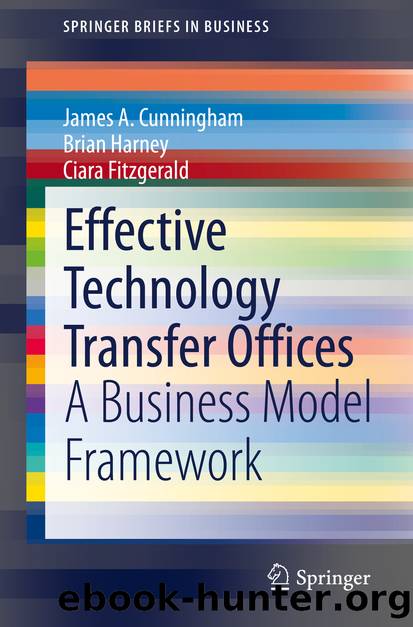Effective Technology Transfer Offices by James A. Cunningham & Brian Harney & Ciara Fitzgerald

Author:James A. Cunningham & Brian Harney & Ciara Fitzgerald
Language: eng
Format: epub
ISBN: 9783030419462
Publisher: Springer International Publishing
3.3.3 Focus on Core Activities and Developing Core Competencies
Research from best practice institutions stresses that as TTOs develop they need to become more strategic in their focus and develop expertise in specific areas in which they wish to excel (Brint 2005). In order to reduce the likelihood of being overburdened and missing commercialisation opportunities, there is a necessity to shed non-core activities so that resources and attention can be focused on previously identified strategic priorities. Fassin (2000) emphasises the need for TTOs to focus on their core competency, i.e. making deals. Where possible TTOs should minimise academic obligations and shed responsibilities for everything except technology transfer (MTAs, contracts, etc.). In the process of developing a strategic plan, activities should be prioritised in the context of resource constraints and the previously identified technology platforms and research priorities.
Research by Jones-Evans et al. (1999) has highlighted the more sophisticated approach of TTOs in the Swedish context. A longitudinal study of Chinese universities found that they create value through ‘dynamic management and active orchestration of assets’ (Yuan et al. 2018). While TTOs still serve as one stop shop, in practice this means that certain requests are referred to other offices/centres within the university, which have taken over and developed expertise in these areas such as career placement, student placement, etc. Universities and research institutions cannot be everything and must differentiate themselves and use their TTO to exploit the research that may prove most valuable. This means that they can focus on developing strong networks and build alliance capabilities that support effective technology transfer (Leischnig and Geigenmüller 2020). As Muscio (2010: 199) notes: ‘Managing a TTO requires special skills to facilitate the matching of academic knowledge, competencies and resources to business needs, and provide assistance in the commercialization and pricing of technology. The involvement of professional, non-academic managers in TTOs will support these activities and help to bridge the cultural gap between university and industry’. Moreover, with experienced staff and well-established policies are practices are more likely to attain better technology transfer results (González-Pernía et al. 2013). Therefore, TTOs need to consistently invest in developing individual and collective competencies and skills as well as putting in place clear policies and procedures that support TTOs.
Download
This site does not store any files on its server. We only index and link to content provided by other sites. Please contact the content providers to delete copyright contents if any and email us, we'll remove relevant links or contents immediately.
Hit Refresh by Satya Nadella(8328)
The Compound Effect by Darren Hardy(7544)
Change Your Questions, Change Your Life by Marilee Adams(6635)
Nudge - Improving Decisions about Health, Wealth, and Happiness by Thaler Sunstein(6629)
The Black Swan by Nassim Nicholas Taleb(6182)
Daring Greatly by Brene Brown(5636)
Deep Work by Cal Newport(5451)
Principles: Life and Work by Ray Dalio(5315)
Rich Dad Poor Dad by Robert T. Kiyosaki(5140)
The Myth of the Strong Leader by Archie Brown(4785)
Man-made Catastrophes and Risk Information Concealment by Dmitry Chernov & Didier Sornette(4728)
Big Magic: Creative Living Beyond Fear by Elizabeth Gilbert(4716)
The Slight Edge by Jeff Olson(4715)
Discipline Equals Freedom by Jocko Willink(4629)
The Motivation Myth by Jeff Haden(4521)
Digital Minimalism by Cal Newport;(4509)
Stone's Rules by Roger Stone(4412)
Management Strategies for the Cloud Revolution: How Cloud Computing Is Transforming Business and Why You Can't Afford to Be Left Behind by Charles Babcock(4127)
The Doodle Revolution by Sunni Brown(4034)
